

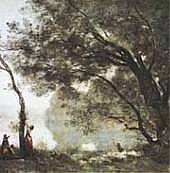
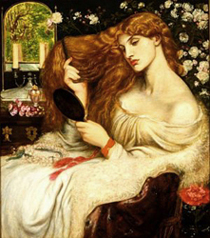

Art in Willa Cather's Fiction
My Mortal Enemy (1926)

The extent to which Willa Cather was interested in and influenced by art has been carefully documented by Polly P. Duryea in her 1993 dissertation Paintings and Drawings in Willa Cather's Prose: A Catalogue Raisonne. To facilitate appreciation of Cather's art allusions, I have gathered together here images of the art identified by Duryea and selected quotations and commentary from her dissertation.
Cather's "My Mortal Enemy" is a novella about Myra Henshawe's later regrets over her youthful romantic elopement with the unfaithful Oscar, as viewed through the eyes of the younger woman Nellie Birdseye.

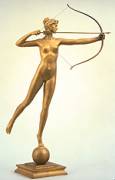
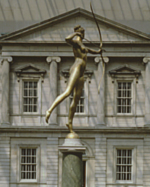
Augustus Saint Gaudens, Diana, 1893-99
Cather describes Myra's apartment as being across from
the
statue--perhaps in a building like the one pictured above?
- Nellie Birdseye:
- "The snow lay in clinging folds on the bushes and outlined every twig of every tree--a line of white upon a line of black. Madison Square Garden, new and spacious then, looked to me so light and fanciful, and Saint Gaudens' Diana, of which Mrs. Henshawe had told me, stepped out freely and fearlessly into the grey air. I lingered long by the intermittent fountain. Its rhythmical splash was like the voice of the place . . . the sound was musical, seemed to come from the throat of the spring. . . . Here, I felt, winter brought no desolation; it was tamed, like a polar bear led on a leash by a beautiful lady." (Mortal Enemy pp. 21-22, Vintage Classics).

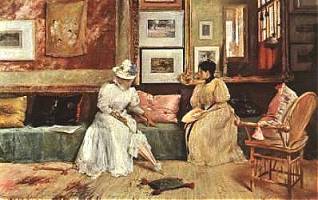
William Merritt Chase, A Friendly Call, 1895.
- According to Duryea, "This Chase painting ['A Friendly Call'] recalls the women who gather together in My Mortal Enemy (1926). Cather, like Chase, used the framed image over and over again. As an example of a picture inside Cather's textual one, Nellie Birdeye remembers while visiting 'very large rooms, much upholstered and furnished, walls hung with large paintings in massive frames, and many stiff, dumpy little sofas, in which women sat two-and-two, while the men stood about the refreshment tables, drinking champagne and coffee and smoking fat black cigars'" (My Mortal Enemy 50).

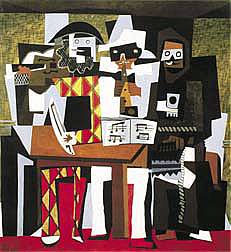
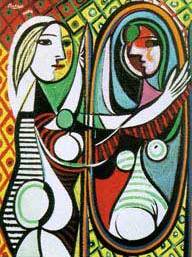
Pablo Picasso, (left) The Three Musicians 1921 and (right) Girl before a Mirror, 1932
- Duryea claims that "It's not just a coincidence that Nellie Birdseye first sees Myra Driscoll Henshawe framed through a hallway door, and then again framed closer, dramatically reflected in a large mirror (MME 11). Cather actually described herself as a writer who painted Myra Henshawes's portrait from the reflected images as seen in the mirrors that were placed around the room." (Cather, Willa. "Letter to Pendleton Hogan." 5 Feb. 1940. Willa Cather Collection. Alderman Library, University of Virginia 22903-2498).
- Duryea also claims that "Cather's reflections of Myra-in-the-mirror no longer show the traditional 'window-perspective' but now define her manifold personality in fractured images that touch the Freudian subconscious. These distorted images recall Picasso's contorted and subverted subjects like those in his rendition of The Three Musicians. His painting entered the Museum of Modern Art, New York City, in 1921, the same year that Cather wrote My Mortal Enemy. "

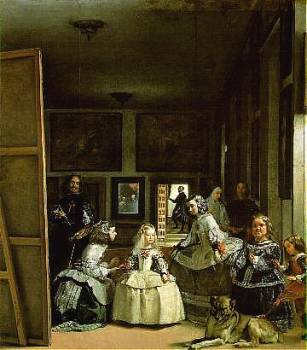
Diego Velázquez, Las Meninas, 1656.
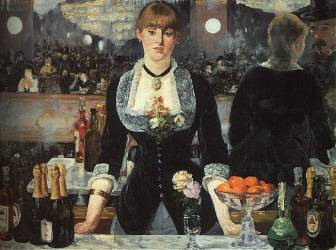
Edouard Manet, A Bar at the Folies-Bergeres, 1882.
- According to Duryea, "One aspect of this Manet painting is interesting because of its conflicting reflective surfaces. Manet's composition looks back to the dislocated space in Velázquez's Las Meninas, and forward to a comparable use in Cather's textual reflections. Examples of her reflective-imaging are most readily available in her novels Alexander's Bridge [8-9, 52, 105, 138], and My Mortal Enemy [11, 45, 50, 78]."

Related Resources:
Death Comes for the Archbishop
Comments/Suggestions: knichols11@cox.net
Updated: 12-14-12


